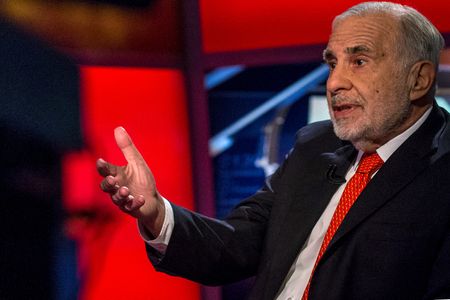By Svea Herbst-Bayliss and David Carnevali
NEW YORK (Reuters) – Activist investor Carl Icahn has dropped a threat to mount a new challenge to Illumina’s board, sparing the U.S. gene sequencing company from its second proxy contest in as many years, according to people familiar with the matter.
Icahn, who installed one of his nominees to Illumina’s board last year through a proxy contest, had said in December he wanted to oust more Illumina directors, blaming them for the company losing three-quarters of its market value because of mismanagement and its soured $7.1 billion acquisition of blood test maker Grail.
Icahn saw little value in a new proxy contest after Illumina took steps to comply with antitrust rulings to divest Grail, the sources added.
The 88-year-old billionaire investor is pressing on with a lawsuit he filed against Illumina board directors last year, accusing them of breaching their fiduciary duty by completing the acquisition of Grail in defiance of antitrust regulators.
The sources requested anonymity because Icahn’s decision to abandon a second proxy contest has not been announced. Icahn and Illumina declined to comment.
Icahn had been preparing for a second proxy contest against Illumina for months, getting in touch with potential board directors and seeking counsel from experts on whether Illumina shareholders would back him, the sources said.
Icahn got enough Illumina shareholder support to get one of three nominees he put forward elected as board directors last year. Illumina CEO Francis deSouza was subsequently replaced by former Agilent Technologies executive Jacob Thaysen, and by December, the company announced had plans to divest Grail.
Illumina founded Grail and spun it off in 2016. Grail went on to raise funding from investors such as Bill Gates and Jeff Bezos. Illumina was left with a 12% stake, and decided in 2021 to acquire Grail to enter the cancer early-detection market.
The deal was opposed by antitrust regulators over concerns Illumina would stop Grail’s rivals from accessing its technology to develop competing blood-based early cancer detection tests.
Illumina proceeded with the acquisition regardless, only to be slapped with a record 432 millions euro ($466 million) fine by the European Commision and be ordered to sell Grail.
Illumina has said that it will jettison Grail by divesting it or spinning it off as a separate publicly listed company. The deal has taken a heavy toll on Illumina, whose business is otherwise lucrative thanks to its ubiquitous DNA sequencing machines.
Grail’s greater-than-expected expenditures and delays in advancing its tests forced Illumina to writedowns that Icahn says have totaled $4.7 billion.
Credit ratings agency Fitch in December pegged Grail’s annual operating losses to about $600 million. These are due to Grail’s spending to advance its product pipeline and its bid to get its Galleri test, which can detect more than 50 types of cancer through blood samples, cleared by health regulators.
(Reporting by Svea Herbst-Bayliss and David Carnevali in New York; Editing by Marguerita Choy)

